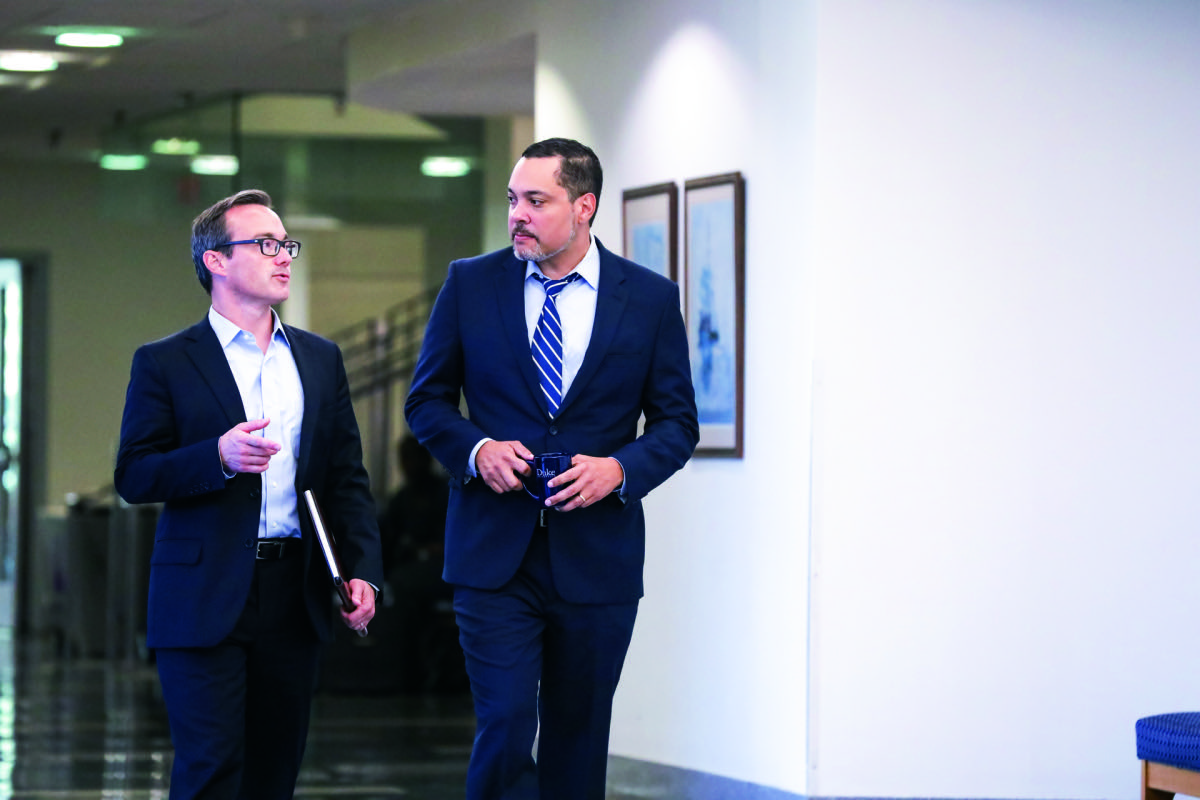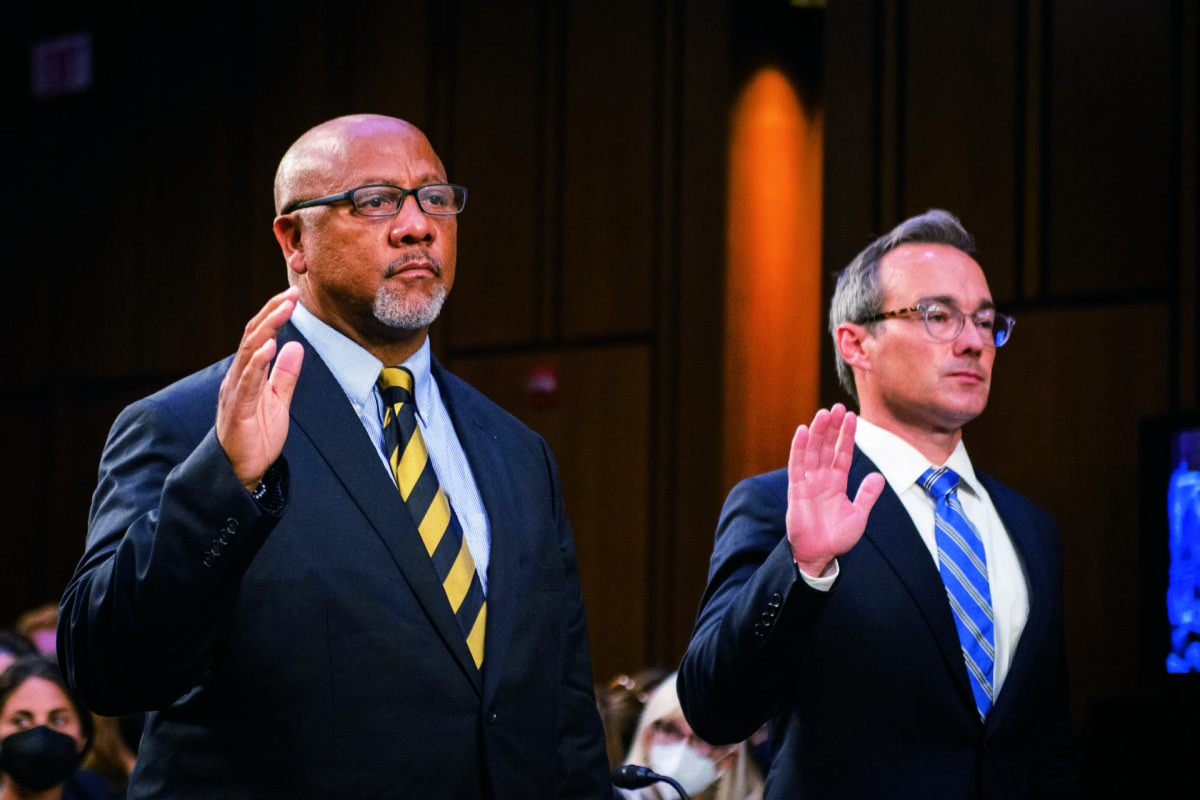In June 2022 the U.S. Supreme Court delivered its ruling in New York State Rifle & Pistol Association v. Bruen, finding unconstitutional a longstanding New York law requiring residents to demonstrate special need to receive unrestricted concealed-carry licenses. The decision made front pages and broadcasts all over the nation, which might have left you thinking that the court had just added to a teetering pile of Second Amendment jurisprudence.
It was indeed a precedent-setting case, significantly strengthening rights of those who wish to carry guns and limiting the power of legislatures to regulate them. But that vast pool of Second Amendment law? It isn’t there.
“The Second Amendment today is kind of where the First Amendment was, in terms of doctrinal development, in the middle of the 20th century,” said Darrell Miller, the Melvin G. Shimm Professor of Law and co-director of the Duke Center for Firearms Law. “I mean, we are really at the kind of birth of a brand new constitutional right and doctrine.”
Not that the Second Amendment – or disagreement about it – is new. But in recent years, courts have moved toward a focus on individual rights to carry guns. The amendment is stretching into new areas – areas about which people have strong and political opinions, leading to conversations that quickly become volatile.
“Our ambition,” Miller says, “is to get people to take the Second Amendment and talk about the important questions – what regulations are compliant with the Second Amendment and what regulations aren’t – rather than to use it in this really political and, you know, binary sense.
“We think the Second Amendment should be a conversation starter rather than a conversation ender.”
As Second Amendment law develops and spreads, and as jurisprudence about that new constitutional right and doctrine develops, the Duke Center for Firearms Law has placed itself at the center of the conversation. Started in 2019 with the goal of filling a void in Second Amendment studies, the center has quickly become the information source it hoped to be. When the Bruen case went before the court, Miller and his co-director, Joseph Blocher, Lanty L. Smith ’67 Professor of Law, and then-executive director Jake Charles AM’13, JD’13, were interviewed dozens of times by media all over the nation. The same thing happened when the decision came out (on the first day new executive director Andrew Willinger L’16 came to work). Miller and Blocher wrote an op-ed for The New York Times raising what they think is the fundamental question about the new ruling.
In fact, after that ruling – and not long after the July 4 parade shooting in Highland Park, Illinois – Blocher sat in front of the Senate Judiciary Committee in Washington, D.C., testifying confidently and even almost cheerfully before lawmakers. His demeanor was unsurprising in that the goal of the center is to spread firearms law scholarship and to avoid taking sides. But it might be considered surprising because Blocher had himself participated in both Bruen and District of Columbia et al. v. Heller, the precedent-setting 2008 case in which the U.S. Supreme Court found D.C.’s ban on handguns in the home unconstitutional, significantly expanding personal gun rights. Both times Blocher came out on the wrong side.
“There’s no doubt,” he said later, laughing, “that I’m 0-2 before the court.”
Early in his career Blocher wrote some of the briefs in Heller, and his work for D.C., supporting the ban, obviously did not get the results he had hoped for. More recently, in Bruen, Blocher and Miller and another professor submitted an amicus brief in favor of neither side but urging the court, however it ruled, to continue to rely on a two-part scrutiny that had long been legal tradition. They urged the court, as appellate courts had done, to evaluate not just legal and cultural history but the likely result of the law itself – “both history and contemporary evidence.”
That line comes from the Times op-ed they wrote after the court ignored their suggestion, choosing to rule instead almost exclusively on historical analogies. As Blocher said to the Senate committee, “According to the court, the constitutionality of … firearms regulations designed to address contemporary real-world problems will now depend solely on whether they are in some sense consistent with historical tradition, and not on whether they are effective in preventing serious harms.”

In spite of his track record on gun cases before the high court, Blocher remained undefeated. He radiated good cheer in front of the Senate to discuss the law. And the next day he remained upbeat when he and Miller together addressed the Capitol Historical Society, via Zoom, on “Our Right to Bear Arms: A History of America’s Most Debated Amendment.”
To the rest of us, perhaps, their reasoned take on an emotionally fraught issue might seem astonishing. How do Miller, Blocher and Willinger demonstrate such equanimity when there seems to be no middle ground in Second Amendment discussion? One group is certain the Constitution guarantees that almost any individual can own and carry virtually any weapon. Others argue for further regulation or even repeal of the amendment itself. And meanwhile, says Charles, “a hundred thousand people are injured with guns each year, and 40,000 people are killed. Millions of people are terrorized by the threat of mass shootings in public spaces.”
“There’s a real sense that it’s about building the scholarly field more than coming out on the right end of a Supreme Court case.”
- Andrew Willinger, executive director, Duke Center for Firearms Law
In that complex world, the center makes its contribution by creating and sharing scholarship about the amendment and firearms law. “There’s a real sense,” says Willinger, “that it’s about building the scholarly field more than coming out on the right end of a Supreme Court case. The more the center and other organizations help to build this as a field, that’s just going to help inform what the court does in the future.” The center’s blog, Second Thoughts, gives voice to the nation’s finest law scholars. The center hosts a unique Repository of Historical Gun Laws, a searchable database of gun laws from medieval times to 1776 in England and from the Colonial era to the mid-20th century, when the first federal gun laws were passed in the United States. And its conferences and discussions bring experts from all sides of any issue.
In fact, Blocher says, “[Willinger] started at nine o’clock on a Thursday; at 10 o’clock that morning the Supreme Court announced its decision in Bruen.” And the next day Willinger had to manage the center’s annual Firearms Law Works in Progress workshop. “That was a day,” Blocher goes on, “when we had, I mean, NRA lawyers, and people who argued that the Second Amendment should be repealed. From sociologists, criminologists, people who haven’t even graduated law school, distinguished chairs. We kind of literally sit around in as close as we could get to a circle to engage in the way [Miller] is describing” – to start, not end conversations. “Trying to not just seem but to be the place where that kind of conversation can happen.” To provide the space for those difficult conversations.
“One thing that helps is that neither of us came into this field with very strong feelings about guns one way or the other,” Miller says. “Not that we are unmoved by the serial horrors of gun violence, or that we don’t have intuitions about what kind of policies would make us all better off. But we have thus far been able to keep a certain emotional distance from the topic.” Blocher agrees: He’s an attorney, a professor, a researcher, and he goes where the evidence leads. “I’m quite familiar with the feeling of having changed my own mind,” he says. “And I think that makes it easier for me to believe that other people can do the same.”
The center officially opened in 2019, but you could say it got its start almost accidentally when Blocher, fresh out of law school, worked in a Washington, D.C., private firm for legendary Duke law professor Walter Dellinger. “Walter took me aside one day and asked what I knew about the Second Amendment. I told him honestly, not much, because it wasn’t taught in law school when I graduated in 2006. And Walter said, ‘Well, that’s interesting. I’ve got a case, maybe you’d be interested in working on it.’” That case turned out to be Heller. Blocher soon joined the Duke faculty, and “I’ve spent my career trying to unwind, frankly, Heller and its aftermath and the history leading up to it.” Unwind, mind you, in the sense of tease out the meaning, not try to undo it. “I should be super clear on that,” he says. In their 2018 book “The Positive Second Amendment,” he and Miller “devoted an entire chapter to why we treat Heller as settled precedent.”
He wrote part of the brief for the other side, and he’s certainly horrified by the tide of firearms deaths in the United States. But the law is the law, and he notes that “75 percent of Americans agreed with the [Heller] result when it came down,” and that both the Obama and McCain presidential campaigns approved. More important, precedent is precedent. The center is not about advocacy on one side or the other: it’s about understanding Second Amendment law. And firearms law has been changing since long before Heller. “It wasn’t until the middle of the 1960s,” Miller notes, “that the federal government forbade a private citizen having a loaded firearm in their carry-on luggage” on an airplane.

Miller came to the Second Amendment much like Blocher did. Although most of his work had been on the 13th Amendment, which abolished slavery, he saw the 2008 Heller decision and thought he’d write a piece on it. “I had a bunch of threads about the Second Amendment and about the privilege of the home as the kind of apex of both personal security and autonomy,” he recalls. “And I wrote this piece, and I sent the draft to Joseph.” The two had never met, but Blocher gladly read the draft. “He gave, as he always does, some really great feedback. And he ended up saying, ‘So when are you going to come visit us here at Duke?’” That turned out to be 2012, and Miller joined the law school in 2013.
The two started the center, with Charles, in 2019 for reasons they describe as pragmatic: With Second Amendment law “a kind of terra incognita,” as Blocher quoted one judge referring to it, there was space to explore and establish themselves and provide needed scholarship in a new specialty, unwinding that Heller decision. Charles, now an associate professor of law at Pepperdine University, remains an affiliated scholar, and looking back to the center’s earliest days he expressed what has made it so successful: “One of [the center’s] main goals is to help get other scholars interested in writing on this so that they could explore these really interesting issues [that are] being developed and are impacting people’s daily lives,” he says. “And then also to help explain and digest this information for public audiences. The work of the center and the maintenance of the repository are going to be just so much more relevant in an era where it seems likely that the court is going to take and decide more Second Amendment questions.”
Miller says the title of the book he and Blocher cowrote, “The Positive Second Amendment,” expresses the center’s approach. The law, he says, is “not divine law, it’s not natural law. It is the thing we as a society make together to bind ourselves together.” And their approach to the Second Amendment “is not about politics, it’s not about ineffable, inscrutable notions from first principles. It is the positive law that we all must live with.”
The center will keep trying to bring people together to clarify and elucidate firearms law. They emphasize the scholarly angle of their work, but they don’t forget the real-world implications: Second Amendment rights aren’t alone. They are counterbalanced by a sense of public peace, “the peace of mind of [people] who might not want to be confronted with a person who’s carrying an AR-style rifle,” Blocher says. The ubiquity of those rifles has a disturbing result: “Nearly 300,000 children have been present in schools where shootings have happened in the United States,” Blocher goes on. That’s a lot of trauma, and a reminder that “their families and friends are out there fighting for, you know, a more sensible approach to gun rights and regulation.
“If they can do it, then it seems like I as a scholar don’t really have any choice but to try to do my best as well.”




